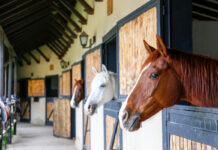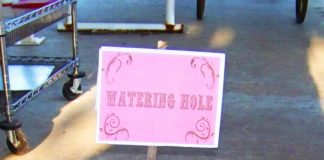
Like many trainers, Nikki Egyed finds great joy in rehabbing & re-training off-the-track Thoroughbreds (OTTBs). But where many others guide their new charges into new careers in English disciplines—dressage, jumping, hunters, eventing—Egyed has discovered their enjoyment of and talents in western work.
“My mother exercised horses at a tiny race track in Michigan, and the first horse I was put on as a toddler was a massive OTTB stallion, Gilly’s Gold,” she explained. “As a kid I went to my first auction and it had a ‘kill pen’ where you can frequently find retired racehorses, from old ‘dried up’ broodmares to young, sound geldings that just never broke Maiden status on the track.”
When the horses her mother purchased at auctions came home, Egyed’s job was “to get on them, see what they knew, or didn’t know, and then work backwards from there to retrain them.”
Since then, she’s used much the same approach with the dozens of OTTBs she’s owned, trained and sold. Her own horses include Flying Cayman (by 1990 Breeders Cup Juvenile Winner and 1991 Triple Crown contender, Fly So Free), Symphonic Cat (grandson of the iconic Storm Cat), O’Connell’s (a Brazilian “war horse” with earnings over $289,000) and Dunbar (by multiple graded stakes winner, Artie Schiller).

Choosing the Right Horse
Egyed looks for the tall (around 16 hands) but stocky OTTBs, with short cannons, sloped croups and a well balanced hip. “These traits tend to help them be better athletes in general,” she said.
She’s also drawn to the “war horses”—race horses with over 100 starts or that have earned more than $100,000 in their careers.
“These are generally older geldings who just ran their guts out over the course of many years, and there’s something special about them if they’ve successfully withstood the physical and mental realities of racing for that long,” she explained. “Because of their heart, honesty and genuine work ethic, they also tend to transition more easily to other disciplines once their race days are over. They like a job and are always eager to learn something new.”
What ends a racing horse’s career? Some have an illness that interrupts their racing, some have an experience that makes them afraid to run (such as intranasal bleeding that interferes with their breathing) and some have an injury that means their racing career is over but they are sound for other disciplines. Others just reach the end of their career and are no longer competitive.
Some OTTBs have no physical issues after they come off the track, and others may need some support or maintenance for the wear and tear caused by racing. “These horses will give you 110% until they drop, so a little maintenance and the occasional extra expenses are totally worth it,” added Egyed.
Restarting Philosophy
While a typical approach to restarting OTTBs is to allow the new retiree to completely let down and be turned out for several months or even a year, Egyed has found a different approach works better.
“With my first horse, I did the usual let-down phase,” she said, “but he responded badly, losing weight and losing his joy of life. I came to realize that racehorses live and thrive by a very strict schedule, and when this was gone, he didn’t have any security or comfort in his new life. He simply didn’t know what to do with himself.”
Now, when she brings home a new horse, she lets them settle overnight and then goes for a light hack the next day. “I tack them up in a Western saddle and work with them a bit in the round pen, and then I get on and we go for a walk.”
Over the next few rides, she assesses what they know and then restarts them like any other green colt.

Personality Plus
Former racehorses have honest, willing natures, with good work ethics, Egyed has found. They enjoy working and having a job.
“Race horses also know a lot more than they’re given credit for,” she said. “People have this belief that they just know how to ‘go fast and turn left.’ The reality is that they have a solid walk, trot and canter under saddle. They know how to work in the bridle, and many know their flying lead changes.” Things that may need to be learned are stopping correctly, developing round collection, turning, and leg yields.
Western Ways
Egyed brings her OTTBs along first as barrel horses, which she finds often is a good channeling of their speed, athleticism and intelligence. “As long as they are mentally and physically sound, it only takes them a couple months to pick up a nice pattern.”
“But my heart isn’t broken if a horse doesn’t love to run barrels,” she added. “My goal is for all my horses to be good athletes and to be able to do a variety of things. They all can go on trail rides, work cattle at team sorting events, canter a hunt course, carry a beginner through basic lessons and place in the ribbons in the horsemanship and equitation show pens. Heck, my best barrel horse is only five years old, and he’s been cleaning up the hunter/jumper ring with a novice student while I’ve been on ‘vacation’ with a broken leg!”

Not only does the variety and cross training lead to happier, well-balanced horses, but it gives each horse more opportunities to be a good horse for a new owner—and help them find that special, forever home.
Just Good Horses
When asked why she does this work, Egyed said it’s to help save more of the thousands of Thoroughbreds born every year that don’t make it on the track, for whatever reason.
“These are just good horses,” she said. “They’re talented, versatile and athletic with great minds and a big heart. When I take them to a barrel race or an open show, I often get the comment, ‘Well, your OTTB is different than the usual Thoroughbreds,’ insinuating that OTTBs are wild, untrainable and high-strung.”
She paused. “I want to change that perception. My horses aren’t the exceptions; they’re the examples: great horses, who happen to be OTTBs.”
Over time, she is seeing positive changes in the horse world. The Retired Racehorse Project is one group that’s doing a good job of spreading the word and creating a sustainable market for ex-racehorses everywhere.
“I encourage every rider to give an OTTB a chance, and don’t buy into the stereotypes that they’re high maintenance, only suitable for English disciplines or hard to handle,” she said.
“Their intelligence and sensitivity mean they can’t be dominated and forced to do things, as some breeds can, which also means that more sensitive riders find them a joy to work with.”
That’s a recipe for success, any way you look at it.
For more information:
Retired Racehorse Project: www.retiredracehorsetraining.org
Silver Shadow Training: www.silvershadowtraining.com






Rescues are over worked trying to help OTTBs, and I wish the racing industry would do more to help be responsible for what they have caused.
great info